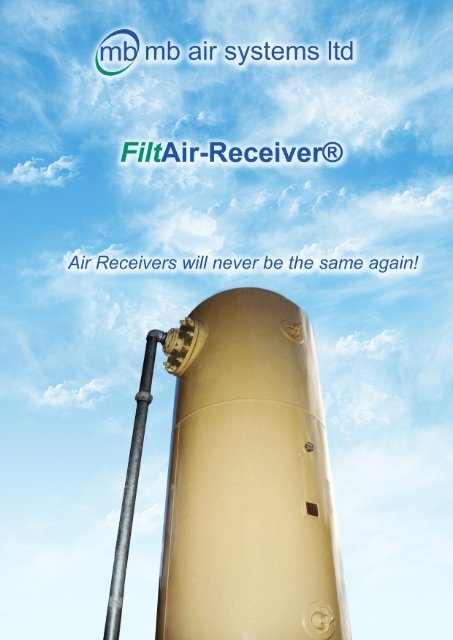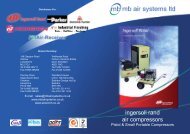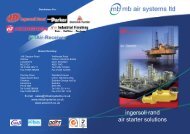You also want an ePaper? Increase the reach of your titles
YUMPU automatically turns print PDFs into web optimized ePapers that Google loves.
What does it do?<br />
• Provides compressed <strong>air</strong> storage.<br />
<strong>FiltAir</strong>-<strong>Receiver</strong> ®<br />
(Patent Pending)<br />
• Significantly reduces the compressed <strong>air</strong> and contaminants’ velocity.<br />
• Simplifies contaminant separation.<br />
• Provides downstream compressed <strong>air</strong> quality similar to general-purpose<br />
filters.<br />
• Achieves negligible pressure drop across the unit.<br />
• Reduces energy costs.<br />
• Achieves longer separator element life, typically more than 5 times that of a<br />
general-purpose filter.<br />
• Reduces maintenance costs.<br />
• Reduces installation costs.<br />
• Reduces disposal costs.<br />
• <strong>FiltAir</strong>-<strong>Receiver</strong> ® reduces your total costs, even the upfront costs!<br />
What does it do for your business?<br />
• <strong>FiltAir</strong>-<strong>Receiver</strong> ® increases your profitability.<br />
Air <strong>Receiver</strong>s will never be the same.
Background:<br />
Air <strong>Receiver</strong>s:<br />
Air <strong>Receiver</strong>s have been one of the most under-rated pieces of equipment in a compressed <strong>air</strong> system.<br />
In virtually all industrial applications compressed <strong>air</strong> demand varies. Air storage vessels in a compressed<br />
<strong>air</strong> system balance the flow of <strong>air</strong> to the service lines and compressor controls.<br />
It has the following main functions:<br />
• Acts as a reservoir that can be called upon to meet intermittent demands that are in<br />
excess of the compressor's capacity.<br />
• Prevents the compressor cycling too frequently.<br />
• Precipitates condensate, which might be present in the <strong>air</strong>.<br />
• Reduces the <strong>air</strong> velocity through the vessel.<br />
General Purpose Filters:<br />
Filtration is required to remove contaminants from the compressed <strong>air</strong>. General Purpose Filters are fitted<br />
before <strong>air</strong> dryers and often after an <strong>air</strong> receiver.<br />
However in carrying out it's function the filter element will become increasingly blocked which can cause<br />
reliability problems, compromising product quality and increased energy consumption through increased<br />
pressure drops. Filter elements should be regularly checked as part of a plant maintenance programme<br />
and replaced when the pressure differential approaches 0.4 barg or sooner. Most filter manufacturers<br />
recommend that filter elements should be replaced every 6 months.<br />
A 0.4 barg pressure drop equates to 3% increase in <strong>air</strong> compressor energy consumption!<br />
Innovation:<br />
<strong>FiltAir</strong>-<strong>Receiver</strong> (Patent Pending):<br />
<strong>FiltAir</strong>-<strong>Receiver</strong> co<strong>mb</strong>ines the benefit of <strong>air</strong> storage and general purpose filtration in one simple<br />
solution. The unit is fitted with an integral separator element, which has been used successfully in a<br />
rotary screw <strong>air</strong> compressor's separator tank design for almost 30 years.<br />
The separator element, located at the discharge point of the vessel, is a moulded fibreglass two stage<br />
reinforced element. The outer layer of the element has a 0.5 micron rating and is designed to remove<br />
debris and contaminant from the compressed <strong>air</strong> as it passes through the element.<br />
Compressed <strong>air</strong> velocity, including the velocity of contaminants in an <strong>air</strong> storage vessel, is significantly<br />
reduced. Gravity also reduces the contaminants' kinetic energy as they approach the separator element.<br />
This occurrence enables the separation to take place with minimum effort and consequently with an<br />
almost negligible pressure drop. <strong>FiltAir</strong>-<strong>Receiver</strong> can easily achieve an energy saving of 3% compared<br />
to a conventional system requiring filter element replacement at an average pressure differential of 0.4<br />
barg.<br />
This simple separation results in much longer separator element life. Typically only one element change<br />
over a 5 year period will be required. This compares with 5 element changes in a conventional system.<br />
Furthermore <strong>FiltAir</strong>-<strong>Receiver</strong> can provide additional protection and contaminant separation in an<br />
excessive oil carry over situation preventing the need for additional equipment such as oil eliminators.<br />
So simple!<br />
Air <strong>Receiver</strong>s will never be the same.
Cost Comparison - Minimum Measure<br />
37 KW Air Compressor 55 KW Air Compressor<br />
6 m3/min - 7 barg 10 m3/min - 7 barg<br />
Conventional System Year 1 10 Years Conventional System Year 1 10 Years<br />
1000 Litres Air <strong>Receiver</strong> £1,600 £1,600 2000 Litres Air <strong>Receiver</strong> £2,200 £2,200<br />
Zero Loss Drain £300 £300 Zero Loss Drain £300 £300<br />
General Purpose Filter £500 £500 General Purpose Filter £600 £600<br />
Zero Loss Drain £135 £135 Zero Loss Drain £135 £135<br />
Filter Element £120 £1,200 Filter Element £130 £1,300<br />
Sub Total £2,655 £3,735 Sub Total £3,365 £4,535<br />
Energy relating to 0.4 barg PD £533 £5,328 Energy relating to 0.4 barg PD £792 £7,920<br />
Total £3,188 £9,063 Total £4,157 £12,455<br />
<strong>FiltAir</strong>-<strong>Receiver</strong> Year 1 10 Years <strong>FiltAir</strong>-<strong>Receiver</strong> Year 1 10 Years<br />
<strong>FiltAir</strong>-<strong>Receiver</strong> 1000 £3,290 £3,290 <strong>FiltAir</strong>-<strong>Receiver</strong> 2000 £4,565 £4,565<br />
Element £0 £300 Element £0 £300<br />
Total £3,290 £3,590 Total £4,565 £4,865<br />
Savings over 10 years £5,473 Savings over 10 years £7,590<br />
Energy cost relating to 0.4 barg pressure differential is based on the unit operating in average at 80% load, 6000 hours per year & @ £0.10 per KW/H.
Cost Comparison - Minimum Measure<br />
90 KW Air Compressor 160 KW Air Compressor<br />
16 m3/min - 7 barg 28 m3/min - 7 barg<br />
Conventional System Year 1 10 Years Conventional System Year 1 10 Years<br />
3000 litres Air <strong>Receiver</strong> £3,250 £3,250 5000 litres Air <strong>Receiver</strong> £4,000 £4,000<br />
Zero Loss Drain £300 £300 Zero Loss Drain £300 £300<br />
General Purpose Filter £1,000 £1,000 General Purpose Filter £1,400 £1,400<br />
Zero Loss Drain £135 £135 Zero Loss Drain £135 £135<br />
Filter Element £225 £2,250 Filter Element £350 £3,500<br />
Sub Total £4,910 £6,935 Sub Total £6,185 £9,335<br />
Energy relating to 0.4 barg PD £1,296 £12,960 Energy relating to 0.4 barg PD £2,304 £23,040<br />
Total £6,206 £19,895 Total £8,489 £32,375<br />
<strong>FiltAir</strong>-<strong>Receiver</strong> Year 1 10 Years <strong>FiltAir</strong>-<strong>Receiver</strong> Year 1 10 Years<br />
<strong>FiltAir</strong>-<strong>Receiver</strong> 3000 £6,125 £6,125 <strong>FiltAir</strong>-<strong>Receiver</strong> 5000 £7,490 £7,490<br />
Element £0 £650 Element £0 £650<br />
Total £6,125 £6,775 Total £7,490 £8,140<br />
Savings over 10 years £13,120 Savings over 10 years £24,235<br />
Energy cost relating to 0.4 barg pressure differential is based on the unit operating in average at 80% load, 6000 hours per year & @ £0.10 per KW/H.
Cost Comparison - Maximum Measure<br />
37 KW Air Compressor 55 KW Air Compressor<br />
6 m3/min - 7 barg 10 m3/min - 7 barg<br />
Conventional System Year 1 10 Years Conventional System Year 1 10 Years<br />
1000 litres Air <strong>Receiver</strong> £1,600 £1,600 2000 litres Air <strong>Receiver</strong> £2,200 £2,200<br />
Zero Loss Drain £300 £300 Zero Loss Drain £300 £300<br />
General Purpose Filter £500 £500 General Purpose Filter £600 £600<br />
Zero Loss Drain £135 £135 Zero Loss Drain £135 £135<br />
Filter Element £120 £1,200 Filter Element £130 £1,300<br />
Oil Eliminator £2,900 £2,900 Oil Eliminator £3,200 £3,200<br />
Oil Eliminator Element £0 £1,850 Oil Eliminator Element £0 £2,000<br />
Zero Loss Drain £135 £135 Zero Loss Drain £135 £135<br />
Sub Total £5,690 £8,620 Sub Total £6,700 £9,870<br />
Energy relating to 0.4 barg PD £972 £9,724 Energy relating to 0.4 barg PD £1,445 £14,454<br />
Total £6,662 £18,344 Total £8,145 £24,324<br />
<strong>FiltAir</strong>-<strong>Receiver</strong> Year 1 10 Years <strong>FiltAir</strong>-<strong>Receiver</strong> Year 1 10 Years<br />
<strong>FiltAir</strong>-<strong>Receiver</strong> 1000 £3,290 £3,290 <strong>FiltAir</strong>-<strong>Receiver</strong> 2000 £4,565 £4,565<br />
Element £0 £300 Element £0 £300<br />
Total £3,290 £3,590 Total £4,565 £4,865<br />
Savings over 10 years £14,754 Savings over 10 years £19,459<br />
Energy cost relating to 0.4 barg pressure differential is based on the unit operating @ full load, 8760 hours per year & @ £0.10 per KW/H.
Cost Comparison - Maximum Measure<br />
90 KW Air Compressor 160 KW Air Compressor<br />
16 m3/min - 7 barg 28 m3/min - 7 barg<br />
Conventional System Year 1 10 Years Conventional System Year 1 10 Years<br />
3000 litres Air <strong>Receiver</strong> £3,250 £3,250 5000 litres Air <strong>Receiver</strong> £4,000 £4,000<br />
Zero Loss Drain £300 £300 Zero Loss Drain £300 £300<br />
General Purpose Filter £1,000 £1,000 General Purpose Filter £1,400 £1,400<br />
Zero Loss Drain £135 £135 Zero Loss Drain £135 £135<br />
Filter Element £225 £2,250 Filter Element £350 £3,500<br />
Oil Eliminator £3,200 £3,200 Oil Eliminator £5,400 £5,400<br />
Oil Eliminator Element £0 £2,000 Oil Eliminator Element £0 £3,000<br />
Zero Loss Drain £135 £135 Zero Loss Drain £135 £135<br />
Sub Total £8,245 £12,270 Sub Total £11,720 £17,870<br />
Energy relating to 0.4 barg PD £2,365 £23,652 Energy relating to 0.4 barg PD £4,205 £42,048<br />
Total £10,610 £35,922 Total £15,925 £59,918<br />
<strong>FiltAir</strong>-<strong>Receiver</strong> Year 1 10 Years <strong>FiltAir</strong>-<strong>Receiver</strong> Year 1 10 Years<br />
<strong>FiltAir</strong>-<strong>Receiver</strong> 3000 £6,125 £6,125 <strong>FiltAir</strong>-<strong>Receiver</strong> 5000 £7,490 £7,490<br />
Element £0 £650 Element £0 £650<br />
Total £6,125 £6,775 Total £7,490 £8,140<br />
Savings over 10 years £29,147 Savings over 10 years £51,778<br />
Energy cost relating to 0.4 barg pressure differential is based on the unit operating @ full load, 8760 hours per year & @ £0.10 per KW/H.





